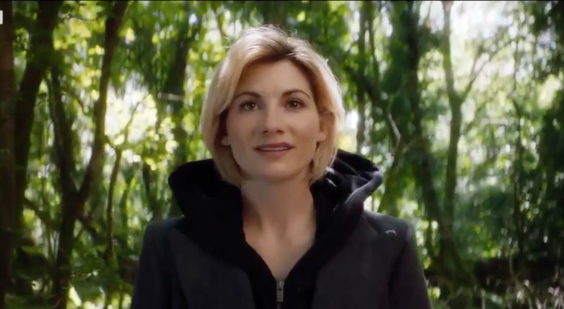New Doctor for a New World
I may be in the midst of chaos these days, but I couldn't let the introduction of a new star for Doctor Who go unmentioned, especially since they've cast a woman, Jodie Whittaker, in the role for the first time.

The choice was both a surprise and not a surprise. Jodie Whittaker worked with incoming showrunner Chris Chibnall on Broadchurch, and for months people had been suggesting Chibnall would choose an actress from Broadchurch - just not this particular actress. I hadn't heard her name come up until right before the decision was announced. But I still think it's a good choice. Her Broadchurch character was a victim for the first two seasons, but then rebounded in the final season and started to take back her life. It made for a good range of acting challenges.
Predictably, the internet exploded after the choice was announced. To be honest, the mix of people who were excited about the choice and people who were angry about it was more-or-less what I'd expected, no matter who the choice had been. That's just how it goes with a show that's reinvented itself multiple times over more than fifty years. But because Jodie Whittaker is a woman, we're seeing a different kind of complaint this time around. I have two points to make about those.
First, regarding the claim that casting a woman is nothing more than "political correctness" run wild.
Accusing something of being "politically correct" is usually a fig leaf for someone who wants to say "I don't like it," but feels a need to justify doing so. It tries to invalidate the choice by discrediting the person who chose, accusing them of being dishonest or insincere, unwilling to make the "right" decision. Often, the accuser is trying to turn attention away from their own bigotry by pointing the finger at someone else.
As a writer, my response to that accusation is - Yeah, guilty as charged. Sometimes we do make choices about our characters for social or political reasons. It happens all the time. And so what?
Chris Chibnall is on record saying he wanted to cast a woman as the Doctor. So what? Gene Roddenberry deliberately made the crew of the starship Enterprise multiracial, with a mix of men and women. He did it on purpose, to make a point. Was he being "politically correct?" You betcha. And I've done it, too. My main character in the Mathematical Nights books is a girl on purpose. Her best friend is an African-American boy on purpose. I did it in those books, and I'm sure I'll do it again someday. Political and social motivations are just tools in the toolbox. They have been for uncounted generations.
The proof is in the reading, or in this case, the watching. Whether or not the motivations behind a character were "pure" (whatever that means) has nothing to do with whether the character and the story work. If you think that kind of thing matters enough for you to pre-judge a story, that really says more about you than it does about the writer or the actor.
And second, regarding the complaint that casting a woman goes against the "tradition" of Doctor Who, the "established canon" of the past fifty-four years. My reply to that is - Yeah, you're right. Get over it.
I was immediately reminded of something I wrote back in January, about the way my nieces' response to the musical Hamilton taught me things about life, the flow of generational change and the importance of embracing the future without fear. "The America that's coming," I wrote back then, "will be something new and different, and that's exciting. But at the same time, the America that's coming can still be built on the same foundations that America has always been built on." If that principle can apply to an entire country, then surely it can apply to a TV show as well.
Look, Peter Capaldi has been my favorite Doctor since the revival. He is more "my Doctor" than any of the others, an old-school Doctor in the mold of Jon Pertwee and Tom Baker. To me, he's great - but to others, not so much. Ratings are down and merchandising is off, and you can point the finger at any number of scapegoats - "bad writing," "bad time slots," "bad companion characters," "bad producers" or whatever - but I think the bottom line is that this particular way of doing Doctor Who simply isn't connecting with the young folks. It's nobody's fault. It's just the march of time.
Take a cruise around social media and check out the way younger Doctor Who fans are reacting to Jodie Whittaker's unveiling. They're excited. There are fanarts and the like popping up online already, even though we know almost nothing about the character. The 13th Doctor is their Doctor, and there's nothing wrong with that. We've had our turn for fifty-four years (and really, we'll go on having our turn on audio, because they do excellent work over at Big Finish). It's time to let the kids have a turn.
So, to paraphrase what I said back in January, there's a new Doctor Who coming. We old folks might not like everything in it, but we should welcome it anyway. Experiencing new things is what makes life interesting, no matter how old you are. And isn't that the message of Doctor Who anyway?

The choice was both a surprise and not a surprise. Jodie Whittaker worked with incoming showrunner Chris Chibnall on Broadchurch, and for months people had been suggesting Chibnall would choose an actress from Broadchurch - just not this particular actress. I hadn't heard her name come up until right before the decision was announced. But I still think it's a good choice. Her Broadchurch character was a victim for the first two seasons, but then rebounded in the final season and started to take back her life. It made for a good range of acting challenges.
Predictably, the internet exploded after the choice was announced. To be honest, the mix of people who were excited about the choice and people who were angry about it was more-or-less what I'd expected, no matter who the choice had been. That's just how it goes with a show that's reinvented itself multiple times over more than fifty years. But because Jodie Whittaker is a woman, we're seeing a different kind of complaint this time around. I have two points to make about those.
First, regarding the claim that casting a woman is nothing more than "political correctness" run wild.
Accusing something of being "politically correct" is usually a fig leaf for someone who wants to say "I don't like it," but feels a need to justify doing so. It tries to invalidate the choice by discrediting the person who chose, accusing them of being dishonest or insincere, unwilling to make the "right" decision. Often, the accuser is trying to turn attention away from their own bigotry by pointing the finger at someone else.
As a writer, my response to that accusation is - Yeah, guilty as charged. Sometimes we do make choices about our characters for social or political reasons. It happens all the time. And so what?
Chris Chibnall is on record saying he wanted to cast a woman as the Doctor. So what? Gene Roddenberry deliberately made the crew of the starship Enterprise multiracial, with a mix of men and women. He did it on purpose, to make a point. Was he being "politically correct?" You betcha. And I've done it, too. My main character in the Mathematical Nights books is a girl on purpose. Her best friend is an African-American boy on purpose. I did it in those books, and I'm sure I'll do it again someday. Political and social motivations are just tools in the toolbox. They have been for uncounted generations.
The proof is in the reading, or in this case, the watching. Whether or not the motivations behind a character were "pure" (whatever that means) has nothing to do with whether the character and the story work. If you think that kind of thing matters enough for you to pre-judge a story, that really says more about you than it does about the writer or the actor.
And second, regarding the complaint that casting a woman goes against the "tradition" of Doctor Who, the "established canon" of the past fifty-four years. My reply to that is - Yeah, you're right. Get over it.
I was immediately reminded of something I wrote back in January, about the way my nieces' response to the musical Hamilton taught me things about life, the flow of generational change and the importance of embracing the future without fear. "The America that's coming," I wrote back then, "will be something new and different, and that's exciting. But at the same time, the America that's coming can still be built on the same foundations that America has always been built on." If that principle can apply to an entire country, then surely it can apply to a TV show as well.
Look, Peter Capaldi has been my favorite Doctor since the revival. He is more "my Doctor" than any of the others, an old-school Doctor in the mold of Jon Pertwee and Tom Baker. To me, he's great - but to others, not so much. Ratings are down and merchandising is off, and you can point the finger at any number of scapegoats - "bad writing," "bad time slots," "bad companion characters," "bad producers" or whatever - but I think the bottom line is that this particular way of doing Doctor Who simply isn't connecting with the young folks. It's nobody's fault. It's just the march of time.
Take a cruise around social media and check out the way younger Doctor Who fans are reacting to Jodie Whittaker's unveiling. They're excited. There are fanarts and the like popping up online already, even though we know almost nothing about the character. The 13th Doctor is their Doctor, and there's nothing wrong with that. We've had our turn for fifty-four years (and really, we'll go on having our turn on audio, because they do excellent work over at Big Finish). It's time to let the kids have a turn.
So, to paraphrase what I said back in January, there's a new Doctor Who coming. We old folks might not like everything in it, but we should welcome it anyway. Experiencing new things is what makes life interesting, no matter how old you are. And isn't that the message of Doctor Who anyway?



Comments